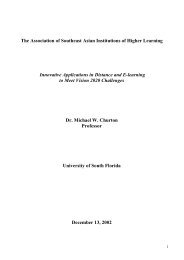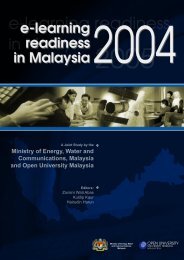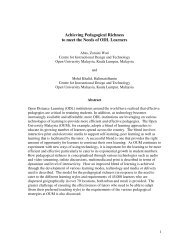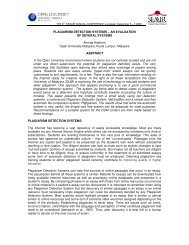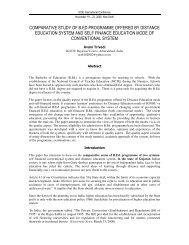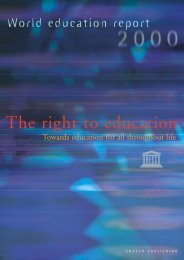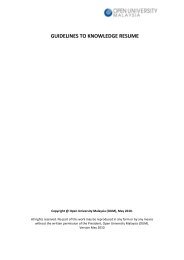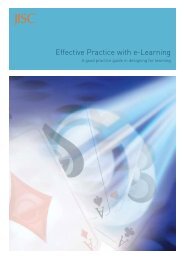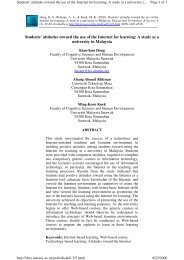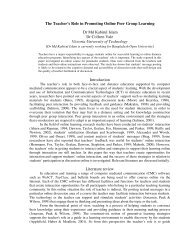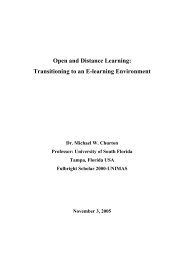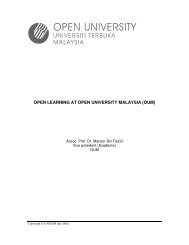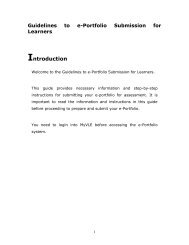humility: coming to admit that nobody nowadays can master this rapidly-evolving sum ofknowledge single-h<strong>and</strong>ed. It is also necessary to depend on the services of the technicianwho puts the course online, for this is not necessarily one of the academic’s skills. All thisleads to a degree of confusion reflected, according to Nicholas Corder, in an uncertaintyover what to call this new profession of “adult educator”:“Teacher” makes you sound like a school teacher, “Tutor” smacks of Oxbridge colleges,“Trainer” sounds like a soccer coach. “Lecturer” implies that all you’re going to do islecture. I dislike the word ‘Instructor’ even more — flat-pack furniture has “instructions”.My pet hate is the word “Facilitator” because it is so ugly, even if it is a useful idea.“Educator” sounds pompous (Corder, 2002, quoted from a review by Carmel Dennisonin the online journal Widening Participation, Vol. 6, No.1, April 2004).This confusion is all the greater because teachers can see that the process is complex<strong>and</strong> many-sided. The models we looked at earlier — utilitarian, humanist, compensatory— are not mutually exclusive but complementary, <strong>and</strong> teachers who want to be effectivemust take this into account if they are to respond to all their students’ needs.A similar effort is also needed for governance, or the management of <strong>higher</strong> <strong>education</strong>institutions. They will have to revise their accustomed use of available space <strong>and</strong> time,in order to adapt to these new clients. When they come to the campus — for it is a goodidea to combine <strong>distance</strong> teaching with blocks of attendance in person — this has to beorganised taking their personal <strong>and</strong> professional obligations into account, by means ofevening <strong>and</strong> weekend classes, crash courses, holiday sessions, etc. Teaching hours <strong>and</strong>the use of teaching rooms become flexible in order to accommodate the needs of studentsrather than the wishes of teachers, who have to adjust to these new constraints.As a logical <strong>and</strong> necessary consequence, the administrative departments <strong>and</strong> their staffare called on in turn to make their offices, libraries, information <strong>and</strong> counselling servicesopen <strong>and</strong> accessible, for these cannot be closed when the clientele needs them. One canunderst<strong>and</strong> what a revolution in the management of premises <strong>and</strong> human resources allthis can involve for institutions <strong>and</strong> their senior managements, which do not alwayshave much room for manoeuvre in these areas, especially in periods of restructuring <strong>and</strong>budget cuts.It is necessary, therefore, to turn to partnerships that can contribute to the commoneffort. We have already pointed out, in discussing the last point, that <strong>higher</strong> <strong>education</strong>cannot meet the challenge of <strong>lifelong</strong> <strong>learning</strong> on its own. The notion of partnership isat the heart of the new process: partnership with political decision-makers who definethe objectives, with parliamentarians who cast these in legally binding form; partnershipwith business <strong>and</strong> the world of work, for this is the source of the motivation behind thedem<strong>and</strong> for <strong>learning</strong>, <strong>and</strong> of financial contributions to the training of human resources,present or future; <strong>and</strong> partnership with the local authorities which put resources intodefining local employment needs <strong>and</strong> setting up <strong>learning</strong> centres. The Queensl<strong>and</strong>state government in Australia, for instance, has managed to facilitate access to <strong>higher</strong><strong>education</strong> for isolated communities by supporting local authorities in actions of this kind.Finally, there should be partnerships within the institutions themselves, between membersof the administrative <strong>and</strong> teaching staffs who need to combine their skills if they are tomeet the needs of these non traditional students. As Adam Smith (The Wealth of Nations,1776) recommended, the division of labour is a sure way to efficiency; <strong>and</strong> popularwisdom recognises that “unity is strength”.Taking up all these challenges in the learners’ best interests is in itself a moral issue forthe institutions that start along this path; but they very quickly discover the full ethical17
force of the undertaking. Here again, the Council of Europe has studied this particularpoint in depth, as its very vocation requires, <strong>and</strong> has made recommendations, for instance,concerning the need for quality.The Council of Europe has pointed out that even in those establishments most disposedto foster <strong>lifelong</strong> <strong>learning</strong>, the departments which deal with it remain “minor” or evenmarginalised by comparison with conventional <strong>education</strong>; <strong>and</strong> it has put forward twoproposals to ensure that this marginal status does not imply “<strong>learning</strong> on the cheap”: first,the university’s teaching body must be involved, to the greatest possible extent <strong>and</strong> at thehighest level, in this branch of activities; <strong>and</strong>, second, there must be no issuing of ad hocin-service training diplomas that have no place among the rigorously named forms ofcertification that are recognised in the labour market. For this reason it would be good ifeventually — <strong>and</strong> indeed as soon as possible — the <strong>lifelong</strong> <strong>learning</strong> clientele could jointhe mainstream, so far as the attribution <strong>and</strong> recognition of academic qualifications wereconcerned. This would help to avoid the danger of a two-tier university with differentrequirements for two types of learners (Council of Europe, 2000).This need for quality is all the more essential when it comes to <strong>distance</strong> teaching. Thoseoffering their teaching services — institutions <strong>and</strong> individuals — must be properlyidentified; they must provide some guarantee of the quality of the teaching they offer; butwho is going to audit this, <strong>and</strong> by what st<strong>and</strong>ards? This is a particularly thorny problem,all the trickier since the clients involved are relatively fragile — are made fragile by thecircumstances of their studying — <strong>and</strong> since they are being called on to pay for theirteaching. Lifelong <strong>learning</strong> begins to look more <strong>and</strong> more like a market ripe for plucking;<strong>and</strong> a great deal of vigilance is needed to sift the good seed from the tares, true provisionfrom the meretricious allurements of dubious value. The fourth issue of “LifelongLearning in Europe” (2004) is devoted to precisely this problem, under the title “Ethics<strong>and</strong> the Lifelong Learning Market”. In the absence of international legislation, the majorintergovernmental organisations — the Council of Europe, the European Union, <strong>and</strong>UNESCO — are producing a wealth of recommendations <strong>and</strong> codes of good practice, sothat all knowledge providers are aware of their responsibilities, <strong>and</strong> respect <strong>and</strong> apply theethical rules concerning quality requirements. 7CONCLUSIONLifelong <strong>learning</strong> presents <strong>higher</strong> <strong>education</strong> with a new challenge. It has already metmany others, not least the challenge of mass university undergraduate provision: weshould recognise that it has indeed tackled this. With success the university has provedit is no brittle, tradition-bound institution, but dynamic, open to progress, capable ofshowing flexibility in adapting to the requirements of a globalised, constantly-evolvingworld.Lifelong <strong>learning</strong>, the indispensable key to the twenty-first century, now requiresuniversities to radically review their structures, modes of functioning, <strong>and</strong> attitudes. Thechallenge is no less than that of modernity itself. We may be confident that they will takeup that challenge with the same steady energy <strong>and</strong> the same determination to serve theinterests of learners above all else. “Where there’s a will, there’s a way”: this is what ittakes to build a Knowledge Society that can really contribute to sustainable development<strong>and</strong> social cohesion.18
- Page 1 and 2: PERSPECTIVES ONDISTANCE EDUCATIONLi
- Page 3 and 4: The Commonwealth of Learning (COL)
- Page 5 and 6: ACKNOWLEDGEMENTSIn addition to the
- Page 7 and 8: These are some of the issues that a
- Page 9 and 10: What are the trends and issues in l
- Page 11 and 12: of policy implications relating to
- Page 13 and 14: evince important differences that c
- Page 15 and 16: inequitable regulations governing t
- Page 17 and 18: associations and groups of countrie
- Page 19 and 20: THE CONTRIBUTORChristopher McIntosh
- Page 21 and 22: INTRODUCTIONIn his 1996 report to U
- Page 23 and 24: Lastly, our analysis of the situati
- Page 25: diploma or similar certificates of
- Page 29 and 30: RELEVANT INTERNET SITESUNESCO Task
- Page 31 and 32: Notes1. This phrasing has been used
- Page 33 and 34: goals (Daniel, 1996). Lifelong lear
- Page 35 and 36: eported that group activity had red
- Page 37 and 38: NEW AREAS FOR DISTANCE EDUCATION:WO
- Page 39 and 40: targets systematically for the use
- Page 41 and 42: Rausch, A.S. (2003). A case study o
- Page 43 and 44: correspondence teaching systems tha
- Page 45 and 46: significant differences between syn
- Page 47 and 48: In distance flexible- and blended-e
- Page 49 and 50: STATE-FUNDED DUAL-MODE SYSTEMS ATUN
- Page 51 and 52: Table 4.2: Fundable elements in dis
- Page 53 and 54: sciences in 21 countries of the reg
- Page 55 and 56: How a system is funded depends in p
- Page 57 and 58: Litto, Fredric M. (2004). Digital l
- Page 59 and 60: CHAPTER 5LIFELONG LEARNING IN THE A
- Page 61 and 62: education, which was initiated by C
- Page 63 and 64: So the virtual classroom acted as a
- Page 65 and 66: In June 2002, when the course came
- Page 67 and 68: RELEVANT INTERNET SITESFORCIIR proj
- Page 69 and 70: 11. The approximate rate for 1€ w
- Page 71 and 72: The term modern distance education
- Page 73 and 74: the National Networked Consortium f
- Page 75 and 76: important resource for undeveloped
- Page 77 and 78:
standards have been proposed for th
- Page 79 and 80:
The development of e-learning withi
- Page 81 and 82:
RELEVANT INTERNET SITESCCRTVU Onlin
- Page 83 and 84:
MoE (2004b) The Notice on Running N
- Page 85 and 86:
CHAPTER 7QUALITY ASSURANCE SURVEYOF
- Page 87 and 88:
(Paris, France, 28-29 June 2004) in
- Page 89 and 90:
Examples of elaborated QA policies:
- Page 91 and 92:
plans and produces its conventional
- Page 93 and 94:
SHTVU (China)• Teaching• Teachi
- Page 95 and 96:
offers its programmes to Turkish ci
- Page 97 and 98:
mega universities apply a set of st
- Page 99 and 100:
RELEVANT INTERNET SITESThe Commonwe
- Page 101 and 102:
2. QA initiatives or publications b
- Page 103 and 104:
assurance of ODL. This DST will be
- Page 105 and 106:
Educational Planning has been respo
- Page 107 and 108:
A system of weighting of the key qu
- Page 109 and 110:
RELEVANT INTERNET SITESHigher Educa
- Page 111 and 112:
CHAPTER 9THE FINNISH VIRTUAL UNIVER
- Page 113 and 114:
foreign providers. In Finland, the
- Page 115 and 116:
to make the best use of new educati
- Page 117 and 118:
The foremost task for the Service U
- Page 119 and 120:
part of quality management. The aim
- Page 121 and 122:
online courses; an educational tech
- Page 123 and 124:
polytechnics, research institutions
- Page 125 and 126:
CHAPTER 10PROMOTING CROSS-BORDERREC
- Page 127 and 128:
The Bologna Declaration was followe
- Page 129 and 130:
indicators currently being used for
- Page 131 and 132:
the qualification resulting from th
- Page 133 and 134:
Table 9.1: Outline of the portfolio
- Page 135 and 136:
• Make sure that incoming student
- Page 137 and 138:
CHAPTER 11CHARTING THE EVOLUTIONOF
- Page 139 and 140:
Another common characteristic was t
- Page 141 and 142:
the current capacity of the educati
- Page 143 and 144:
conditions for success. Conditions
- Page 145 and 146:
Cultural and ethical issues in inte
- Page 147 and 148:
the cost and maintenance of learnin
- Page 149 and 150:
Research can be a useful tool for c
- Page 151 and 152:
REFERENCESBates, A. (1995). Technol
- Page 153 and 154:
Twigg, C. (2001). Quality Assurance
- Page 155 and 156:
y, for example, entering into partn
- Page 157 and 158:
and even greater steps, and the dec



